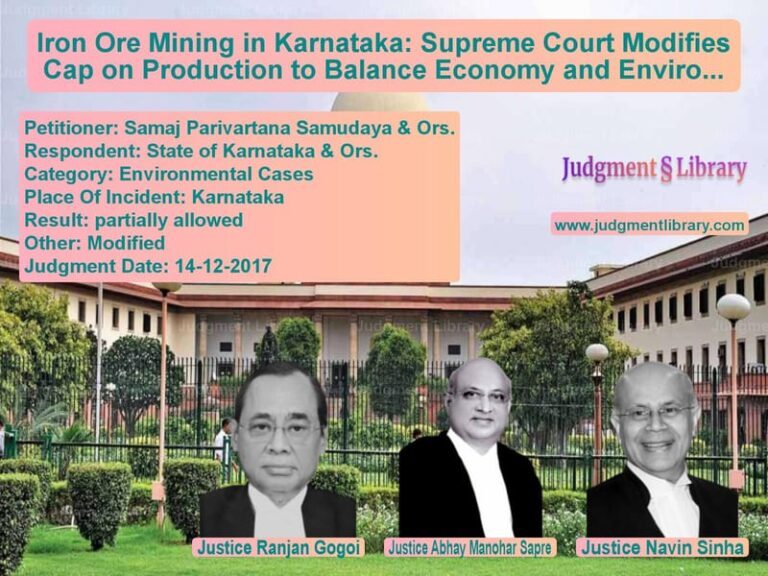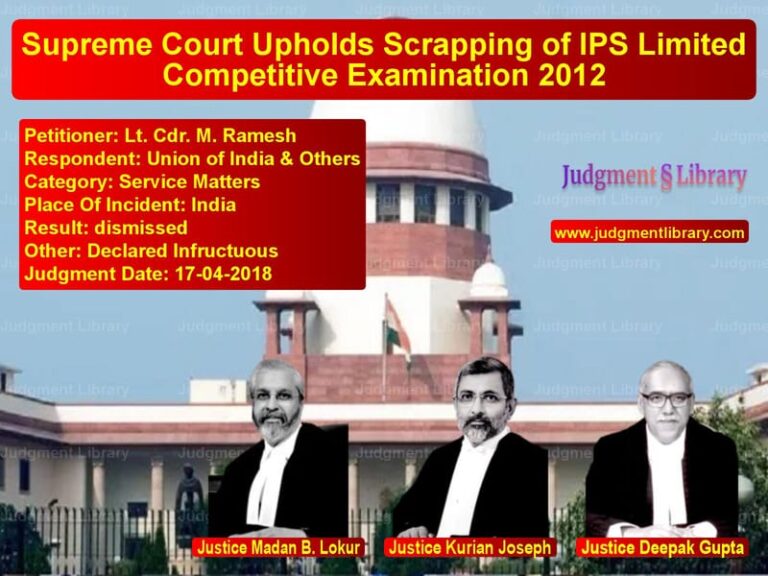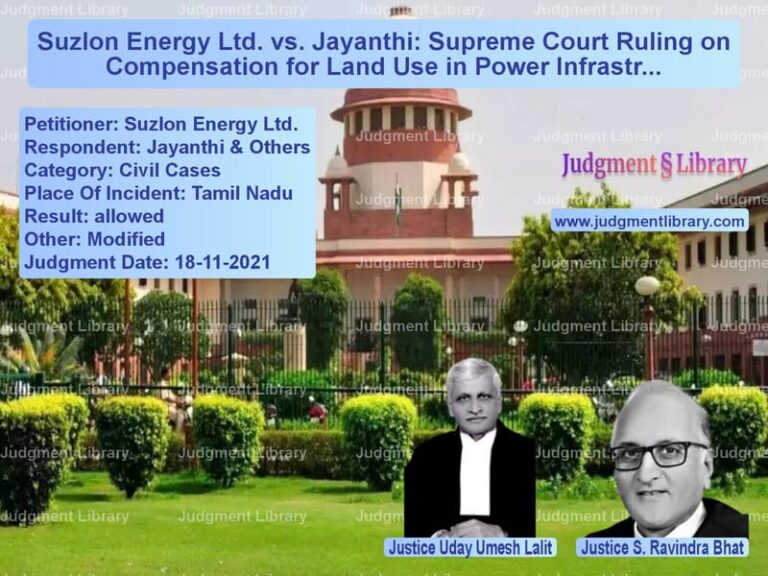Tenant Rights and Property Ownership: Supreme Court Ruling on Long-Term Possession Dispute
The case of Geeta Gupta v. Ramesh Chandra Dwivedi & Others revolves around a long-standing property dispute in Kanpur Nagar, Uttar Pradesh. The Supreme Court had to decide whether the respondent, who had been in possession of a property since 1975, was a legal tenant or an unauthorized occupant. The case also dealt with the Uttar Pradesh Urban Buildings (Regulation of Letting, Rent, and Eviction) Act, 1972, and the rights of a landlord to evict a tenant.
The appeal was filed by Geeta Gupta, who claimed ownership of premises No. 74/13, Collectorganj, Kanpur Nagar, after purchasing the property through a sale deed in 1994. She sought to reclaim possession from the respondent, Ramesh Chandra Dwivedi, who claimed to be a tenant inducted by a previous occupant. The District Magistrate and the Allahabad High Court ruled in favor of the respondent, prompting the appellant to seek relief from the Supreme Court.
Background of the Case
The dispute began when the appellant, Geeta Gupta, purchased the property in 1994 and sought to evict the respondent, Ramesh Chandra Dwivedi. The respondent argued that he had been a tenant since 1975, having been inducted into the premises by Dhruv Narayan Tripathi, who acted as the power of attorney holder and manager of the original owners.
The case involved key legal questions:
- Was the respondent a legally recognized tenant under the Uttar Pradesh Urban Buildings Act?
- Did the appellant have the right to evict the respondent?
- What legal remedies were available to the appellant?
Arguments by the Appellant (Geeta Gupta)
The appellant’s counsel argued that:
- The previous occupant, Dhruv Narayan Tripathi, had no authority to induct the respondent as a tenant.
- The respondent was not paying rent directly to the property owners and had no valid lease agreement.
- Since 1994, the appellant had not received any income from the property, and her rights as an owner were being denied.
- The lower courts had erred in recognizing the respondent’s tenancy based on an unverified agreement from 1975.
Arguments by the Respondent (Ramesh Chandra Dwivedi)
The respondent’s counsel countered:
- He had been a tenant since 1975 and had regularly deposited rent in court.
- The agreement dated November 15, 1975, clearly established him as a tenant.
- The original property owners had never objected to his tenancy from 1975 to 1994.
- Under Section 14 of the Uttar Pradesh Urban Buildings Act, any tenant in possession before July 5, 1976, was deemed a legal tenant.
Supreme Court’s Observations
The Supreme Court analyzed the case in light of the Uttar Pradesh Urban Buildings Act and past precedents. The key observations were:
- The respondent had occupied the premises since 1975 with the knowledge of the original owners.
- There was no evidence that the previous owners objected to the respondent’s tenancy.
- Under Section 14 of the Uttar Pradesh Urban Buildings Act, any tenant in possession before July 5, 1976, with the landlord’s consent, was deemed a legal tenant.
- The appellant, as a new owner, could not claim automatic vacancy of the premises.
- The proper legal recourse for the appellant was to initiate eviction proceedings under Sections 20 or 21 of the Act.
Supreme Court’s Judgment
The Supreme Court dismissed the appellant’s plea, ruling that:
- The respondent was a lawful tenant under the provisions of the Uttar Pradesh Urban Buildings Act.
- The appellant had the right to initiate eviction proceedings but could not seek a direct declaration of vacancy.
- The respondent must continue to deposit rent in the civil court.
- If eviction proceedings were initiated, they should be given priority due to the long-standing nature of the dispute.
Key Takeaways from the Judgment
- Long-term possession with consent establishes tenancy: If a tenant has been in possession for a long time without objection from the landlord, the courts may recognize tenancy rights.
- Landlords must follow proper eviction procedures: Property owners cannot forcibly evict tenants but must approach the appropriate legal forum.
- Legal tenants are protected under the law: The Uttar Pradesh Urban Buildings Act ensures that tenants in possession before 1976 are protected from arbitrary eviction.
- Rent must be regularly deposited: The court emphasized that tenants must continue paying rent, either directly or through legal channels.
- New property owners inherit tenancy obligations: Purchasing a property does not automatically void existing tenancy rights.
Conclusion
The Supreme Court’s ruling in this case reinforces the importance of due process in property disputes. It highlights that long-term tenants with the consent of previous owners cannot be evicted arbitrarily and that landlords must follow established legal procedures for eviction. While the appellant was denied immediate possession, the ruling provides her with legal remedies through eviction proceedings.
Petitioner Name: Geeta Gupta.Respondent Name: Ramesh Chandra Dwivedi & Others.Judgment By: Justice Ajay Rastogi, Justice Abhay S. Oka.Place Of Incident: Kanpur Nagar, Uttar Pradesh.Judgment Date: 20-09-2021.
Don’t miss out on the full details! Download the complete judgment in PDF format below and gain valuable insights instantly!
Download Judgment: geeta-gupta-vs-ramesh-chandra-dwive-supreme-court-of-india-judgment-dated-20-09-2021.pdf
Directly Download Judgment: Directly download this Judgment
See all petitions in Property Disputes
See all petitions in Landlord-Tenant Disputes
See all petitions in Specific Performance
See all petitions in Judgment by Ajay Rastogi
See all petitions in Judgment by Abhay S. Oka
See all petitions in dismissed
See all petitions in supreme court of India judgments September 2021
See all petitions in 2021 judgments
See all posts in Civil Cases Category
See all allowed petitions in Civil Cases Category
See all Dismissed petitions in Civil Cases Category
See all partially allowed petitions in Civil Cases Category







